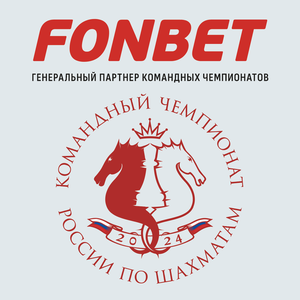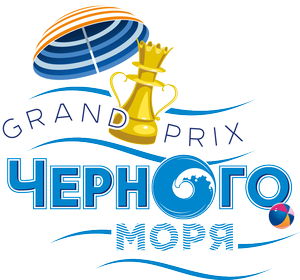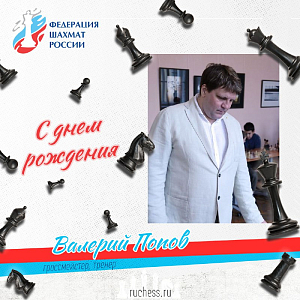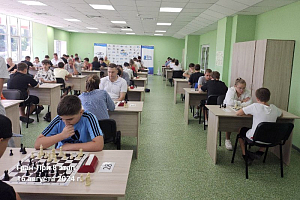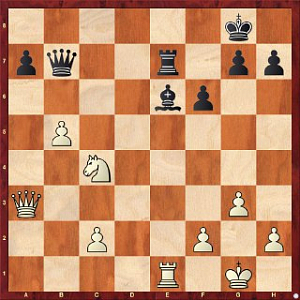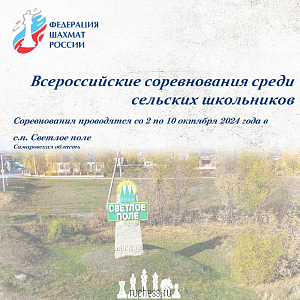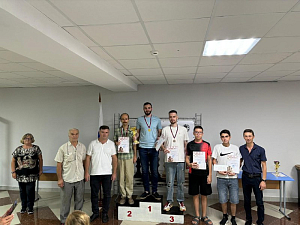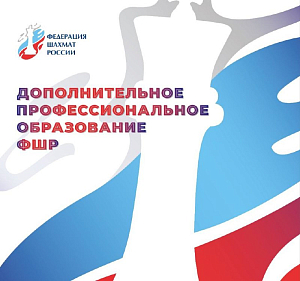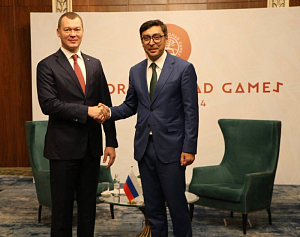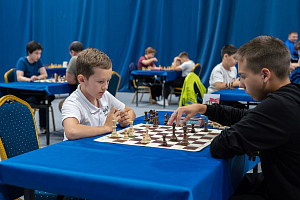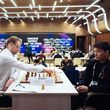Endgame Stars Get Renault Cars
Dmitry Kryakvin’s report about the Superfinal finale
The last two rounds were real battles for the pedestal. In the women's section, as many as five players were contesting the prizes with two rounds to go. Leading the field with one point, Olga Girya was pursued by Valentina Gunina, Alexandra Goryachkina, Alina Kashlinskaya, and Natalija Pogonina. However, the penultimate round has significantly reduced this number.
Pogonina – Gunina
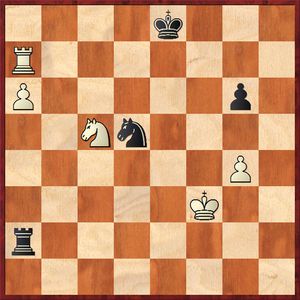
There are only a few pawns on the board, which is no problem at all with Pogonina, as we will see again later on in this report. After 52...Nb4 53.g5 (53.Ra8+ Ke7 54.a7 Nc6 or 53.Kf4 Ra5 54.Ne6 g5+) 53...Ra5 54.Ne6 Ra3+ 55.Ke4 Ra5 Black is just a smidgen away from the draw. But Gunina commits a blunder
52...Ra5? 53.Nb7?!
53.Rb7! Rxc5 54.a7 was an immediate winner.
53...Ra3+
There is no cozy square to tuck the rook into, such as after 53...Ra4 54.Nd6+ Kd8 55.Nb5, and it fell victim to the knight in the end anyway.
54.Ke4 Nc7?
Taking the last step into the abyss. 54...Nb4 should have been played instead. This is a two-mover for White from now on.
55.Nd6+ Kd8 56.Rxc7! Rxa6
56...Kxc7 fails to 57.Nb5+.
57.Nb5 Ra4+ 58.Kf3 Rb4 59.Rc5, and White won.
Alina Kashlinskaya went down to the tournament’s revelation Margarita Potapova and thus fell out of the race for the bronze. Alina came up with an unexpected decision to follow in the footsteps of Daria Charochkina and opened with Trompowsky, which she had also employed against Alexandra Kosteniuk in the last year's Superfinal.
Kashlinskaya – Potapova
1.d4 Nf6 2.Bg5 Ne4 3.Bf4 c5 4.f3 Qa5+ 5.c3 Nf6 6.d5 e6 7.e4 exd5 8.exd5 d6
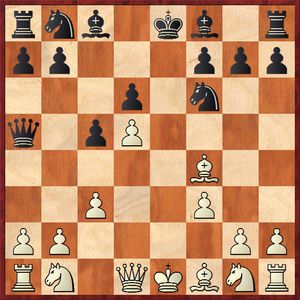
Potapova resorts to a rather popular and principled line. White should stop any nonsense against the d5-pawn by the immediate 9.Qd2!? and 10.с4, with an eye to a more pleasant endgame.
9.Na3 Be7 10.Nc4 Qd8 11.g4 0–0 12.Qd2 Re8 13.0–0–0 b5! 14.Ne3 Qa5 15.Kb1 Nbd7 16.Nf5 Ne5! 17.Nxe7+ Rxe7 18.Bg5 Ned7 19.Qc2 Bb7 20.c4 h6 21.Bd2 Qb6 22.h4 bxc4 23.g5 Nxd5, and Black went on to win.
The opponent's failures paved the way for Aleksandra Goryachkina to finish third. Playing the world title runner-up, Charochkina opted for 1.b3, and not for Trompowsky. There was a moment in the game when Charochkina was up three pawns. Then she would not create the connected passers, and then...
Charochkina – Goryachkina
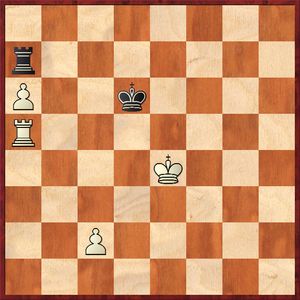
Since his famous game against Levon Aronian, we have been aware of Kramnik’s winning method 70.c4! Kc6 71.c5, and Black is in zugzwang.
70.Kd4 Kc6 71.Kc4 Kb6 72.Kb4 Kc7 73.Kb5? Kb8 74.Kb6
For some reason, everyone was relishing this particular position and the stalemate idea, whereas, in fact, White erred with his previous move. Correct is 73.Rc5+.
74…Rb7+! 75.Kc5 Rc7+ 76.Kb6 Rb7+ 77.axb7 A stalemate!
Alexandra responded to this gift of fate with yet another technical display, outplaying Shuvalova as White.
Goryachkina – Shuvalova
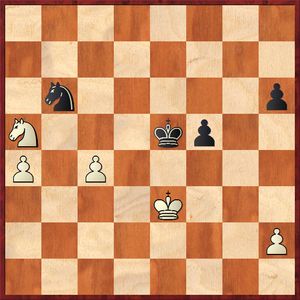
With very few material on the board, it is high time the endgame magic began!
38.Nc6+ Kf6?
This is a fatal error. I wonder, why did Polina choose the wrong path? 38...Kd6 39.Nd4 Nxa4 40.Nxf5+ Kc5 41.Nxh6 Nb2 was a confident draw.
39.a5! Nxc4+ 40.Kf4 Ke6 41.a6 Kd6 42.a7 Nb6 43.Nd4 Kc7 44.Nxf5 Kb7 45.Nxh6 Kxa7
Comparing with the above line, White is up a bunch of tempi, and the knight is known to be a poor fighter against the rook pawn.
46.Nf5 Kb7 47.h4 Kc7 48.h5 Nd7 49.h6 Nf8 50.Kg5 Kd7 51.Kf6 Nh7+
Or 51...Ke8 52.Ng7+ Kd7 53.Kf7 Nh7 54.Ne6 Kd6 55.Nf8 Ng5+ 56.Kf6 Ne4+ 57.Kg6, and White is winning.
52.Kg6 Nf8+ 53.Kf7 Nh7 54.Nd4 Kd6 55.Nf3 Black resigns.
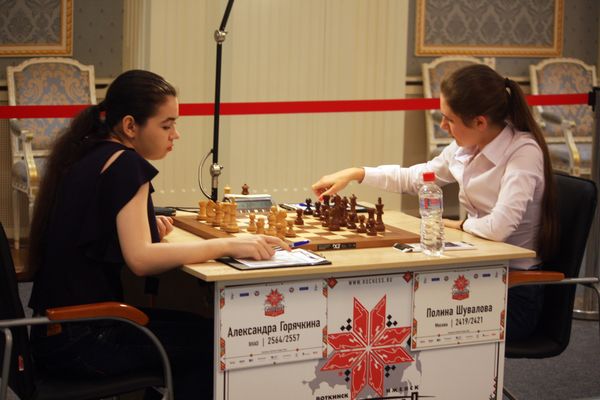
In the last round, Olga Girya decided against pushing her luck and made a quick draw with Margarita Potapova. Being an honest girl, Girya immediately told your correspondent: “It was not a prearranged game... The threefold repetition just happened by itself!” Nevertheless, neither side seemed upset, and while Natasha Pogonina was still doing her best to catch up with the competitor, Girya headed for the hotel to get ready for a potential tie-break.
In order to face Girya in a tie-break, Pogonina needed to outplay Zarina Shafigullina first. Despite the history of previous failures, Shafigullina was eager to give her opponent a battle, and the position was level for the most part of the game.
Shafigullina – Pogonina
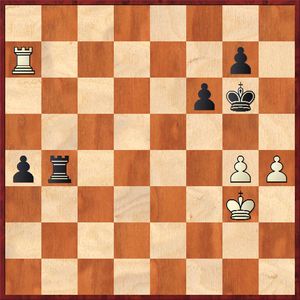
43.Ra5
White could have forced a draw instead with: 43.h5+ Kh6 44.Ra8 Kh7 (44...Rb3+ 45.Kf4) 45.Ra7 Rb3+ 46.Kf4 Ra3 47.g5 fxg5+ 48.Kxg5 Ra1 49.h6!, depriving Black of even the slightest chance of putting White up against any problems, 49…a3 50.Rxg7+ Kh8 51.Ra7 a2 52.Ra8+ Kh7 53.Ra7+ Kg8 54.Ra8+ Kf7 55.h7 Rh1 56.Rxa2 Rxh7. Still, a passive stance spoils nothing yet.
43...Rb3+ 44.Kf4 Ra3 45.g5?
The first and foremost is to stop Black’s f-pawn from becoming a passer. Therefore, correct is 45.Ra7 Ra1 46.Kf3 a3 47.Kg3 Kh6 48.Ra5 a2 49.Kg2 g6 50.Ra6, and Black's king has to go up the board: 50…Kg7 51.Ra7+ Kg8 52.Ra8+ Kf7 53.Ra7+ Ke6 54.Ra6+ Ke5 55.Ra5+ Kd4, and now White is helped out by his remote passer – 56.h5. The text plays into Black's hands, however. It is hard to imaging what Girya was going through at that moment!
45...Ra1 46.h5+ Kh7 47.gxf6
After 47.g6+ Kh6 Black is grabbing both White’s pawns, and a passive stance fails to a well-known mechanism of pushing one pawn to а2, and her fellow to f2, followed by Rh1-h2, and the white rook drops.
47...gxf6 48.Kf5 a3 49.Kxf6 a2 50.Ra7+ Kh6 51.Ra6 Kxh5 52.Kg7 Rg1+ 53.Kh7 a1Q 54.Rh6+ Kg4 55.Rg6+ Kf5 White resigns.
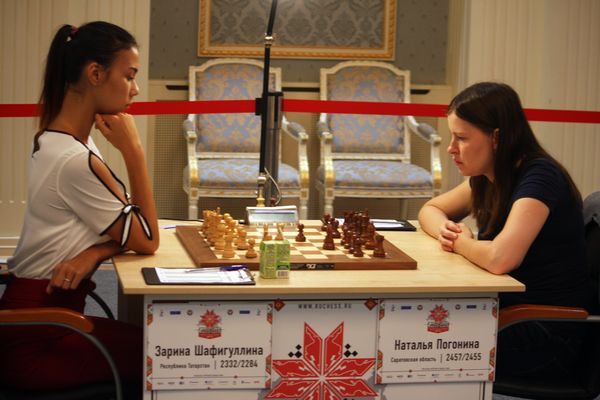
Olga Girya and Natalija Pogonina were to face each other in the Superfinal tiebreak for the second time in a row. As for Natalya Pogonina, it was her fourth tie-break for the Russian champion's title at that (before Girya, she had battled it out against Galliamova and Goryachkina)! If in the previous year's edition, the current national champion practically deprived her opponent of any chances, now Girya arrived with all guns blazing, which became clear as soon as game one.
Girya – Pogonina
1.d4 d5 2.c4 e6 3.Nf3 Nf6 4.Bg5 Be7 5.e3 h6 6.Bxf6 Bxf6 7.Qc2 0–0 8.h4! c5 9.Nc3 cxd4 10.exd4 Nc6 11.0–0–0 a6 12.g4!
Your author is currently writing a book on g2-g4 moves in the closed positions, and this Girya – Pogonina game will complete this work. With the lines to be opened up against her king, Black's situation is very unpleasant indeed. Pogonina's defense was ingenious, but she ended up blundering in time pressure when Girya’s heavy pieces were giving a hard time to her king.
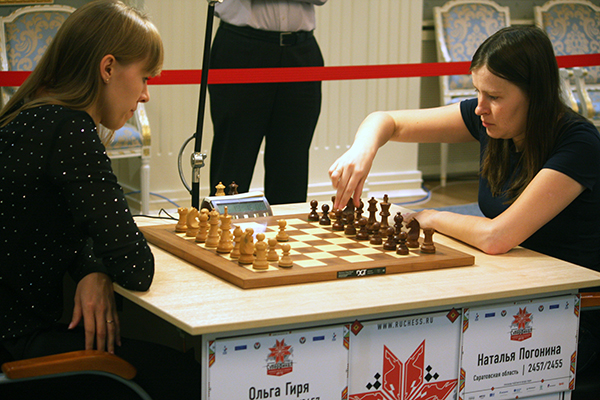
Still, Girya’s nerves gave way in game two.
Pogonina – Girya
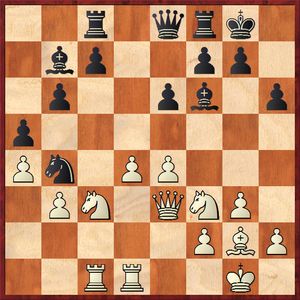
«21…c5 was the way to go, but Girya opted for a modest Qe8-d8-e8-d8, giving time to her opponent to rearrange pieces and deliver a crushing central blow.
No words can do justice to what was happening in the Armageddon game. It was a blitz game with a champion title and a 1.5 mln. car at stake. Nerves were strained to the limit, and Pogonina was playing faster so that Girya’s minute surplus quickly evaporated. Let me remind you that the Armageddon has 5 minutes for White against 4 minutes for Black, and a draw favors the latter.
Girya – Pogonina
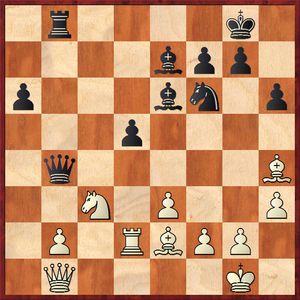
White had a minute and fifty seconds, and Black two and a half minutes; meanwhile, good advice is beyond price for White in this position. Both minors are hanging, and after 26.Bxf6 Bxf6 27.Qd3 a5 only Black can win. There followed, however
26.Bg3?? Rb7??
Blitz and nerves were taking their toll. 26...Qxc3! 27.Rc2 (27.Bxb8 Qxd2) 27...Qb4 was a killer as the two minors are way superior to the rook.
27.Qc1 g6? 28.Bxa6 Rb6 29.Bf1 – and Girya started producing strong moves at a rapid-fire pace, which came as an unpleasant surprise for Black. Soon after Girya appropriated the d5-pawn and made it confidently to move 60 that is a starting-point for the time increment. Pogonina dropped her knight in a lost position.
The way things stand now, Girya, Goryachkina, Pogonina, and Kosteniuk are all with prize cars. Time for Kashlinskaya and Gunina to give it a serious thought as well.
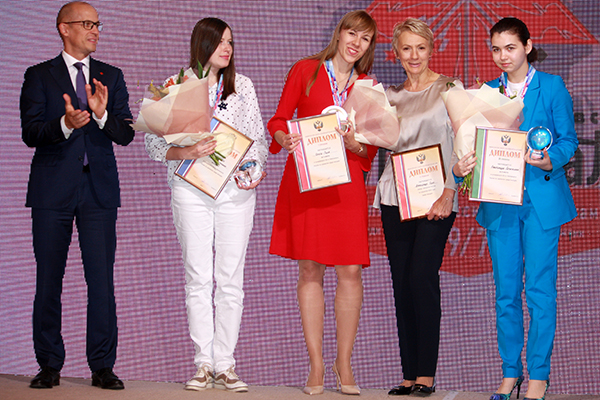
Meanwhile, looming ahead in the men's tournament with one round to go was a many-player round-robin as in the penultimate round Vladislav Artemiev defeated Ernesto Inarkiev, Evgeny Tomashevsky and Nikita Vitiugov were maintaining their lead, and as many as four athletes were only half a point behind.
The last round turned out to be incredibly productive, and even draws resulted from hard-fought battles.
Dreev – Inarkiev
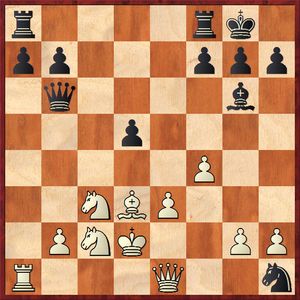
21.Qxh1
The engine shows prophylactic thinking leading to domination and claiming that White is for choice after 21.f5! Bh5 22.Kc1!. The text falls victim to a crushing central blow.
21...d4! 22.exd4 Rac8 23.Ra2
It was still acceptable to go for 23.f5 Qxb2 24.Ra3, and the text gives Black a dangerous attack.
23...Bxd3 24.Kxd3 Qb3! 25.Rxa7?
A solid 25.Ra3 Qxb2 26.Qa1 is correct.
25...b5! 26.Rb7 Qxb2 27.Qe1 Qb3 28.Qa1 Rc6 29.d5?
After 29.Kd2 Rfc8 30.Rxb5 Qxc3+ 31.Qxc3 Rxc3 32.Ne3 White would have remained down an exchange for the pawn, whereas the text allows Inarkiev to deliver a deadly blow.
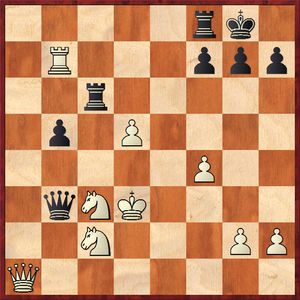
29...Rxc3+! White resigns as the b7-rook is about to fall.
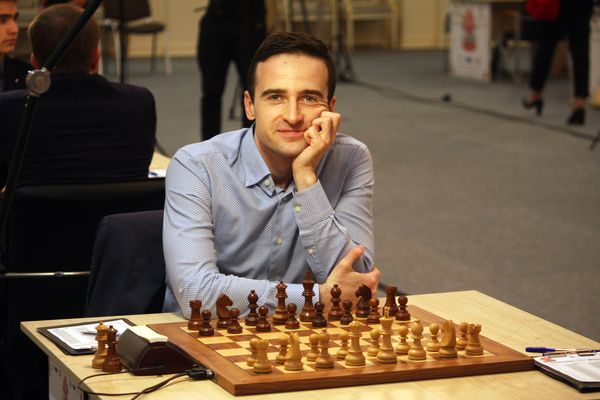
Inarkiev clinched into the share of first, same as Maxim Matlakov.
Matlakov – Predke
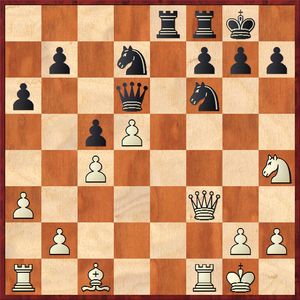
17...Re4
17...Qe5 18.Nf5 is not that clear as White enjoys strong initiative.
18.Bf4 Ne5 19.Qb3 Qd7?
This is definitely a blunder; Black should have bothered the bishop with 19...Nh5!
20.Bxe5 Rxh4
Since 20...Rxe5 21.Qg3 Qe7 (21...Rh5 22.Rxf6) 22.Nf5 loses, Predke has to put up with his king's position to be compromised.
21.Bxf6 gxf6 22.Rxf6 Qg4 23.Raf1 Qd4+ 24.Kh1 Qxc4 25.Qxb7 and White won soon after.
Nikita Vitiugov had to come up with some precise play against Alexey Sarana to make a draw, and now everything was in the hands of Evgeny Tomashevsky, who was putting a lot of pressure on Kirill Alekseenko’s position. Tomashevsky has outplayed his younger opponent, but Alekseenko’s tenacious defense afforded him a chance to bail out.
Tomashevsky – Alekseenko
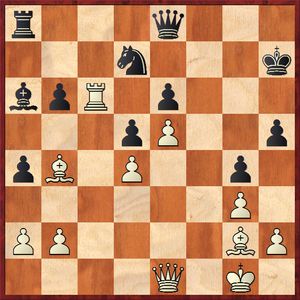
32.Bxd5! exd5 33.Qb1+
33.Qe3 was the way to go as the black bishop is unable to help his king out; however, you instinctively want to force your opponent with checks.
33…Kg7 34.Qf5 Bd3!
Tomashevsky admitted overlooking this defensive resource and finding it hard to calculate 35.Qg5+! Kh8 (35...Bg6 36.e6 Nf8 37.Bxf8+ Qxf8 (37...Kxf8 38.Rc7) 38.Rc7+) 36.Rh6+ Bh7 37.Qf5 Qg8 (37...Nf8 38.Bxf8) 38.Qxd7 with only seconds on his clock, which was a winning continuation.
35.Qxd3 Nxe5 36.Rc7+ Nf7 37.Qf5 Qe3+ 38.Kf1 Qf3+ 39.Qxf3 gxf3 40.Kf2
The time control move marked the game's transposition into the rook ending, in which Black’s king activity gave him some hopes of saving the game. At this moment, the quadruple tie-break started looming large in front of the team of arbiters, but Tomashevsky’s technical performance landed him victorious.
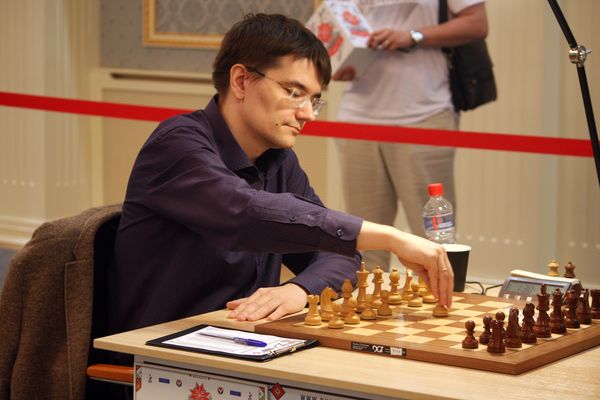
When it came to the share of 2-4 places, Inarkiev was edged out by his inferior tie-breakers in favor of chess players from St. Petersburg. Vitiugov took the silver, and Matlakov the bronze.
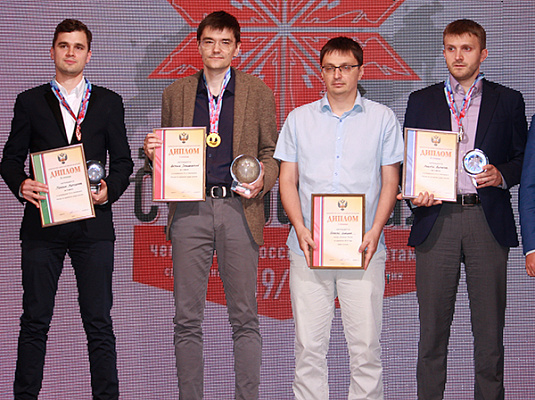
The closing ceremony was spectacular. Music was being played, kind words were being said, and shining on the scene were Buranovskiye Babushki. There were many praising the excellent organization of the Superfinals in Izhevsk. It is hard not to agree with this point of view.
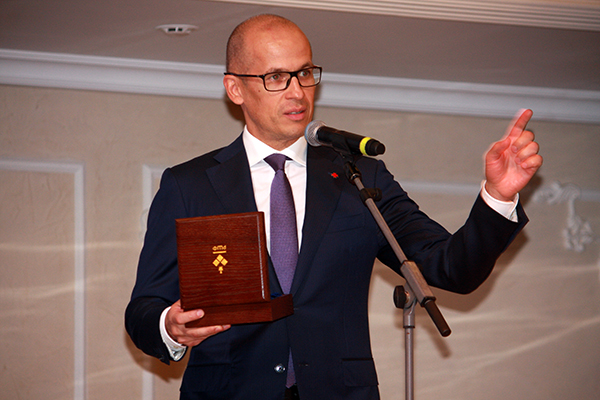
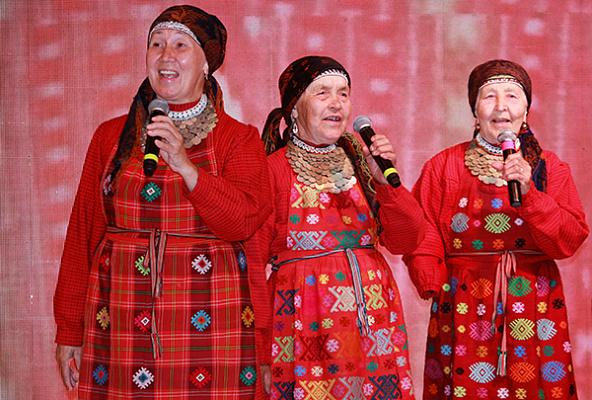
Photos by Dmitry Kryakvin








